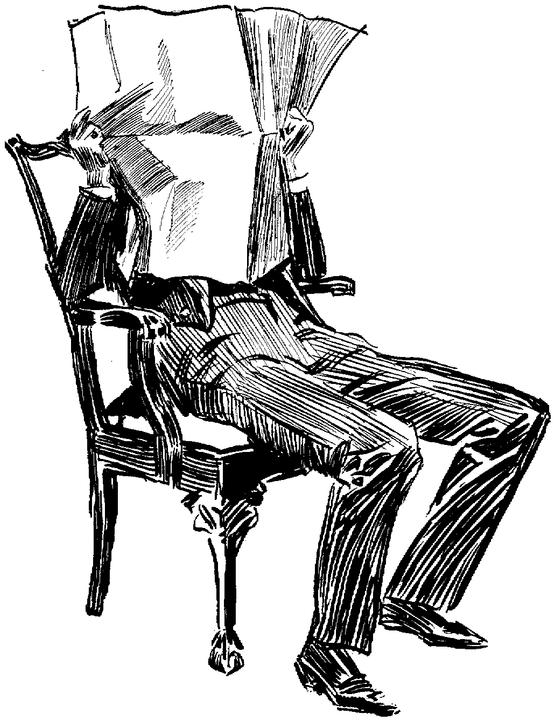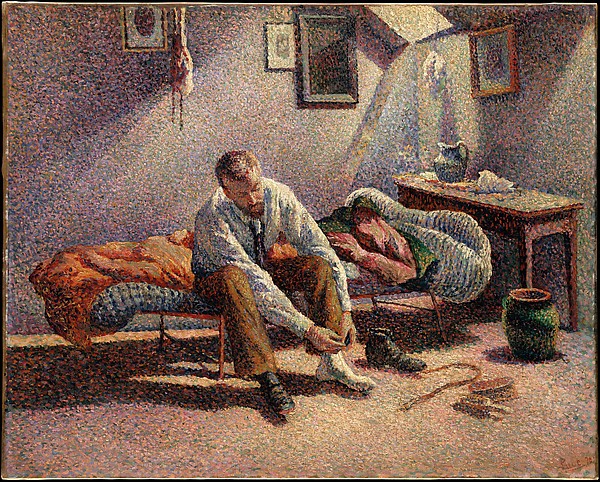
From “Life Without Principle”
By Henry David Thoreau
Just so hollow and ineffectual, for the most part, is our ordinary conversation. Surface meets surface. When our life ceases to be inward and private, conversation degenerates into mere gossip. We rarely meet a man who can tell us any news which he has not read in a newspaper, or been told by his neighbor; and, for the most part, the only difference between us and our fellow is that he has seen the newspaper, or been out to tea, and we have not. In proportion as our inward life fails, we go more constantly and desperately to the post-office. You may depend on it, that the poor fellow who walks away with the greatest number of letters, proud of his extensive correspondence, has not heard from himself this long while.
I do not know but it is too much to read one newspaper a week. I have tried it recently, and for so long it seems to me that I have not dwelt in my native region. The sun, the clouds, the snow, the trees say not so much to me. You cannot serve two masters. It requires more than a day’s devotion to know and to possess the wealth of a day.
We may well be ashamed to tell what things we have read or heard in our day. I did not know why my news should be so trivial, — considering what one’s dreams and expectations are, why the developments should be so paltry. The news we hear, for the most part, is not news to our genius. It is the stalest repetition. You are often tempted to ask why such stress is laid on a particular experience which you have had, — that, after twenty-five years, you should meet Hobbins, Registrar of Deeds, again on the sidewalk. Have you not budged an inch, then? Such is the daily news. Its facts appear to float in the atmosphere, insignificant as the sporules of fungi, and impinge on some neglected thallus, or surface of our minds, which affords a basis for them, and hence a parasitic growth. We should wash ourselves clean of such news. Of what consequence, though our planet explode, if there is no character involved in the explosion? In health we have not the least curiosity about such events. We do not live for idle amusement. I would not run round a corner to see the world blow up.
All summer, and far into the autumn, perchance, you unconsciously went by the newspapers and the news, and now you find it was because the morning and the evening were full of news to you. Your walks were full of incidents. You attended, not to the affairs of Europe, but to your own affairs in Massachusetts fields. If you chance to live and move and have your being in that thin stratum in which the events that make the news transpire, — thinner than the paper on which it is printed, — then these things will fill the world for you; but if you soar above or dive below that plane, you cannot remember nor be reminded of them. Really to see the sun rise or go down every day, so to relate ourselves to a universal fact, would preserve us sane forever. Nations! What are nations? Tartars, and Huns, and Chinamen! Like insects, they swarm. The historian strives in vain to make them memorable. It is for want of a man that there are so many men. It is individuals that populate the world. Any man thinking may say with the Spirit of Lodin, —
“I look down from my height on nations,
And they become ashes before me; —
Calm is my dwelling in the clouds;
Pleasant are the great fields of my rest.”
Pray, let us live without being drawn by dogs, Esquimaux-fashion, tearing over hill and dale, and biting each other’s ears.
Not without a slight shudder at the danger, I often perceive how near I had come to admitting into my mind the details of some trivial affair, — the news of the street; and I am astonished to observe how willing men are to lumber their minds with such rubbish, — to permit idle rumors and incidents of the most insignificant kind to intrude on ground which should be sacred to thought. Shall the mind be a public arena, where the affairs of the street and the gossip of the tea-table chiefly are discussed? Or shall it be a quarter of heaven itself, — an hypæthral temple, consecrated to the service of the gods? I find it so difficult to dispose of the few facts which to me are significant, that I hesitate to burden my attention with those which are insignificant, which only a divine mind could illustrate. Such is, for the most part, the news in newspapers and conversation. It is important to preserve the mind’s chastity in this respect. Think of admitting the details of a single case of the criminal court into our thoughts, to stalk profanely through their very sanctum sanctorum for an hour, ay, for many hours! to make a very bar-room of the mind’s inmost apartment, as if for so long the dust of the street had occupied us, — the very street itself, with all its travel, its bustle, and filth, had passed through our thoughts’ shrine! Would it not be an intellectual and moral suicide? When I have been compelled to sit spectator and auditor in a court-room for some hours, and have seen my neighbors, who were not compelled, stealing in from time to time, and tiptoeing about with washed hands and faces, it has appeared to my mind’s eye, that, when they took off their hats, their ears suddenly expanded into vast hoppers for sound, between which even their narrow heads were crowded. Like the vanes of windmills, they caught the broad but shallow stream of sound, which, after a few titillating gyrations in their coggy brains, passed out the other side. I wondered if, when they got home, they were as careful to wash their ears as before their hands and faces. It has seemed to me, at such a time, that the auditors and the witnesses, the jury and the counsel, the judge and the criminal at the bar, — if I may presume him guilty before he is convicted, — were all equally criminal, and a thunderbolt might be expected to descend and consume them all together.
By all kinds of traps and signboards, threatening the extreme penalty of the divine law, exclude such trespassers from the only ground which can be sacred to you. It is so hard to forget what it is worse than useless to remember! If I am to be a thoroughfare, I prefer that it be of the mountain brooks, the Parnassian streams, and not the town sewers. There is inspiration, that gossip which comes to the ear of the attentive mind from the courts of heaven. There is the profane and stale revelation of the bar-room and the police court. The same ear is fitted to receive both communications. Only the character of the hearer determines to which it shall be open, and to which closed. I believe that the mind can be permanently profaned by the habit of attending to trivial things, so that all our thoughts shall be tinged with triviality. Our very intellect shall be macadamized, as it were, — its foundation broken into fragments for the wheels of travel to roll over; and if you would know what will make the most durable pavement, surpassing rolled stones, spruce blocks, and asphaltum, you have only to look into some of our minds which have been subjected to this treatment so long.
If we have thus desecrated ourselves, — as who has not? — the remedy will be by wariness and devotion to reconsecrate ourselves, and make once more a fane of the mind. We should treat our minds, that is, ourselves, as innocent and ingenuous children, whose guardians we are, and be careful what objects and what subjects we thrust on their attention. Read not the Times. Read the Eternities. Conventionalities are at length as bad as impurities. Even the facts of science may dust the mind by their dryness, unless they are in a sense effaced each morning, or rather rendered fertile by the dews of fresh and living truth. Knowledge does not come to us by details, but in flashes of light from heaven. Yes, every thought that passes through the mind helps to wear and tear it, and to deepen the ruts, which, as in the streets of Pompeii, evince how much it has been used. How many things there are concerning which we might well deliberate whether we had better know them, — had better let their peddling-carts be driven, even at the slowest trot or walk, over that bridge of glorious span by which we trust to pass at last from the farthest brink of time to the nearest shore of eternity! Have we no culture, no refinement, — but skill only to live coarsely and serve the Devil? — to acquire a little worldly wealth, or fame, or liberty, and make a false show with it, as if we were all husk and shell, with no tender and living kernel to us?
Tags: Manvotionals






